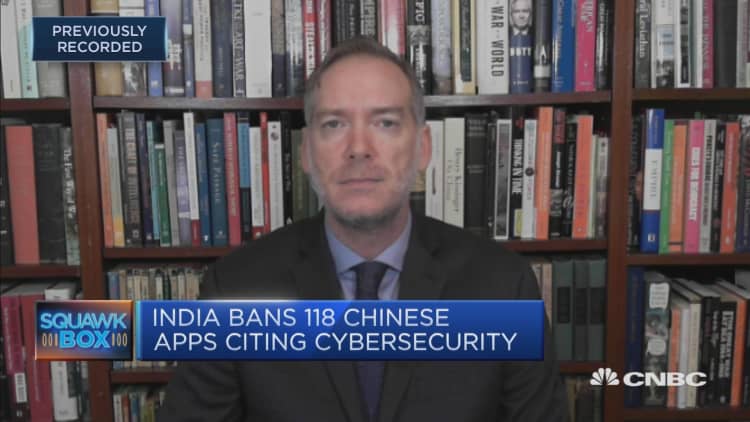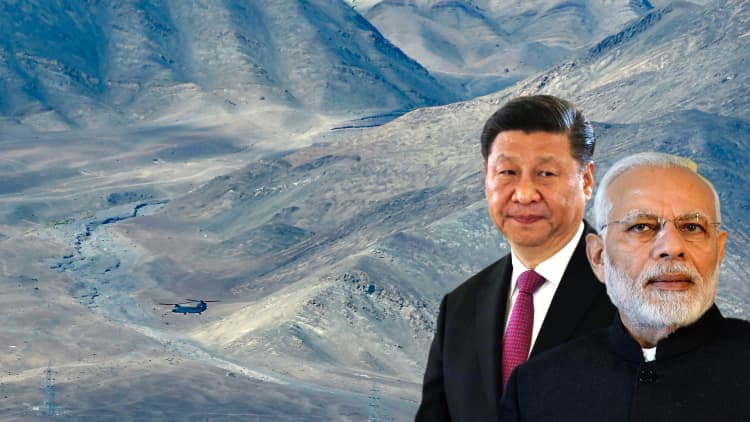India's crackdown on Chinese apps could help the country's homegrown technology firms grow, analysts told CNBC.
This also presents an opportunity for U.S. giants which have long seen the world's fifth-largest economy as critical to their future growth prospects, they said.
On Wednesday, India banned 118 Chinese apps including major hit games from Tencent and NetEase as well as services from the likes of Baidu and Alibaba affiliate, Ant Group.
India's Ministry of Electronics and Information Technology claimed the apps were "engaged in activities which is prejudicial to sovereignty and integrity" of the country. The government also alleged these services sent citizens' data to servers located outside of India.
Earlier in June, India banned 59 Chinese apps. Tensions between the two nations have been on the rise since June, when a border clash left 20 Indian soldiers dead in the disputed Himalayan mountain border in the region of Ladakh.
And those tensions have been flaring up again.
"Chinese firms are learning a painful lesson. And, that is, the foreign policy of China has hijacked their business. China's geopolitics with India has led to a nationwide fallout for Chinese firms," Abishur Prakash, a geopolitical specialist at the Center for Innovating the Future (CIF), a Toronto, Canada-based consulting firm, told CNBC by email.
The Indian government has specifically targeted apps. But Bloomberg reported last month that Chinese telecoms equipment makers Huawei and ZTE are also set to be shut out of India's 5G trials. If it happens, India would be following others — including Australia and the U.K. — in excluding Huawei from its next-generation mobile networks.
The crackdown on Chinese technology presents opportunities for both Indian and U.S. tech firms.
"Certainly, we have seen the Indians taking even a more aggressive stance on banning Chinese apps, Chinese technology, than the United States has proffered in its battle with the Chinese," Rodger Baker, senior vice president of strategic analysis at Stratfor, told CNBC's "Squawk Box Asia" on Thursday.
"Part of that is the Indians trying to stir their own domestic technology, really incentivize the development of their technology sector and try to position themselves also as a place for other countries to be able to invest in technology development."
'Win-win' for India and the U.S.
India has proved attractive to China's technology firms as they have looked to expand outside their domestic market.
Chinese investors and companies have been investing in local companies, putting in an estimated $4 billion into Indian start-ups, according to think tank Gateway House. And 18 of India's 30 so-called unicorns — or start-ups valued at over $1 billion — are now Chinese-funded.
Chinese technology firms know that the days of expanding freely across the world are over.Abishur PrakashCenter for Innovating the Future
Chinese apps like short video-sharing platform TikTok, meanwhile, have managed to challenge big U.S. giants like Facebook and Google, while Chinese smartphone makers like Xiaomi have cemented leading positions in India.
So there is a lot on the line, not just for Chinese technology companies in India but start-ups relying on money from the world's second-largest economy.
"Chinese technology firms know that the days of expanding freely across the world are over," Prakash said.
But it also presents an opportunity for American giants in India, a market they've touted as a major future growth driver and one they've tried to crack with varying degrees of success.
"The banning of Chinese apps leaves a big gap to fill for the industry," Neil Shah, research director at Counterpoint Research, told CNBC.
"It offers more opportunities for established players from U.S. and elsewhere to expand market share. For example, banning on TikTok is benefiting Instagram Reels," he added, referring to Instagram's TikTok rival.

India's backlash against Chinese technology comes as the U.S. continues to put pressure on China's biggest firms. In August, President Donald Trump issued an executive order banning transactions with Tencent and ByteDance, the owner of TikTok. Washington earlier this year also amended a rule that looks to cut Huawei off from critical semiconductor supplies.
"Both India and U.S. are seeing their interests converge. Prime Minister Modi's biggest rule is self-reliance. From defense to e-commerce, he doesn't want India reliant on anything foreign. And, while India has built its own domestic software industry, it lags in hardware, like chips," Prakash said.
"At the same time, U.S. firms are looking for a new base to build hardware and a new consumer base to take their products to. It's a win-win."
Silicon Valley bets on India
Silicon Valley's tech giants have been looking to expand their presence in India.
Apple, which only has a 1% market share in the country, started selling iPhone XR phones assembled in India last year. The Cupertino giant also said it was "eager" to open its first retail store in India. India's smartphone market is dominated by Xiaomi and Samsung which collectively have over 50% market share, according to Counterpoint Research.
Counterpoint's Shah said Apple is not just seeing India as a key market for smartphone demand but also as a manufacturing location as it looks to reduce reliance on China.
"India has more than half a billion smartphone users and second largest smartphone market in the world, and with consumers buying their third or fourth smartphone in (the) coming years, they tend to buy a better phone which opens up opportunities for Apple in premium segment," Shah said.
"Further with anti-China sentiment, it could eventually work in Apple's favor as currently (in) the premium segment, OnePlus is giving tough competition to Apple."
OnePlus is a phone brand owned by Chinese firm BBK Electronics.
Meanwhile, India has proved popular for Facebook and its WhatsApp messaging service, as well as Google's Android and YouTube video platform.

Both Facebook and Google recently invested over $10 billion collectively into Indian digital services firm Jio Platforms. Jio Platforms has a number of brands including its telecommunications business Reliance Jio which has grown rapidly, thanks to competitive pricing to become the number one mobile carrier in India by revenue and subscriber base.
The investment was seen as a way for both technology giants to get a bigger foothold in the Indian market.
"Google and Facebook, unlike Apple don't have access to (the) world's largest smartphone market China. So India is the only large, huge scale smartphone market for these companies," Shah said.
"So partnering with India's largest, most ambitious and influential telco, gives them a great partner to cement their position and scale in the Indian market."
Perfect harmony?
While the latest India-China tensions may dent Chinese tech firms' ambitions in India, it's unlikely to stop their global expansion, but Chinese firms may be more selective, CIF's Prakash said.
"They may start building products and services exclusively for certain markets, instead of for the world. This will intensify geopolitical competition between U.S. and China, as Chinese firms build a bigger footprint in certain regions," Prakash said.
India is also pushing its own homegrown technology agenda under Modi. While India and the U.S. may be aligned on their pressure on Chinese technology, the relationship could be fragile.
"In the short term, through technology, New Delhi and Washington may foster one of the most important relationships in the 21st century. But, in the long term, because of technology, U.S. and India may find themselves in a place similar to where the U.S. and China are today," Prakash said.


